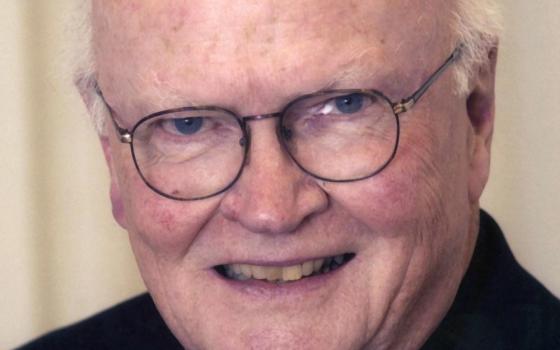A public-relations guru once explained his work to me: "When the city gas main blows up, I convince everybody that it is really urban renewal." Is the new document from the International Theological Commission an explosion in St. Peter's Square that is described as church renewal?
The document, " 'Sensus Fidei' in the Life of the Church," concerns a twofold concept: the sensus fidei, the sense of the faithful believer, and the sensus fidei fidelium, the sense of faith of the faithful believers. It has been welcomed by many theologians who seem pleasantly surprised by its contents.
Fordham University's Bradford Hinze describes the document's "posture of openness," noting that, in effect, it says "that the hierarchy has to recognize that they may not have it right yet" and that Catholics may "deny assent" to church teachings "if they do not recognize in that teaching the voice of Christ."
That is also a good description of "reception," which has been understood as one of the munera, or gifts, of the church from its beginning. This gift is exercised by the People of God who constitute the church and is given to the everyday Catholics who express the sensus fidei fidelium and the sensus fidei that are the subjects of this Roman instrument.
"Reception" is defined in The HarperCollins Encyclopedia of Catholicism as a process whereby the faithful accept a teaching or decision of the church. In the ancient church, confessions of faith, liturgies, and the decrees of councils received general recognition and authority by means of reception. Reception by the believing community has always been the test of whether a teaching is to be regarded as authoritative or not. Furthermore, "recognition by reception is a form of consensus formation in a Church that understands itself as a community of local churches."
In the course of history, "as the particular role of the local churches diminished and the role of a centralized 'lawgiver' became more prominent reception was reduced to obedience." That reduction of reception to a caricature of its traditional meaning remains a vivid memory for many Catholics. Since the Second Vatican Council, "the Church is being rediscovered as community and the role of reception is regaining respect."
Reception is, then, no small gift of the believing community that it can give but withhold as well when the teaching or practice in question does not ring true to apostolic tradition. Examples of non-reception, on matters great and small, abound in the history of the church.
The canon of scriptural books was decided through reception by the community of believers. In a historically small matter, Pope John XXIII's 1962 encyclical restoring Latin as the language of theological education (Veterum Sapientia) was turned into a dead letter by its non-reception by the Catholic community.
As a historical matter of far greater influence and relevance, the non-reception by the churches of Pope Paul VI's restatement of the church's ban of birth control in Humanae Vitae (1968) is understood as rejection by the believing majority.
When non-reception occurs, the teaching in question is erroneous, inadequately expressed or, so to speak, judged unbelievable by the majority of good, faithful Catholics. This gift of reception is a long-accepted expression, then, of the sensus fidelium, the "sense of the faithful" with which the present document concerns itself.
Although often misunderstood, this sense of the faithful is also expressed in other behavior, as, for example, in the drop in the number of confessions after Vatican II. Some have claimed that this "neglect" of penance is part of what its critics call the chaos and confusion sown by that council. This less frequent use of confession was not a rejection of the sacrament of penance, but rather a healthy rejection of the exaggerated sense of sin and guilt that had, for example, made eating meat on Friday as grave a sin as murder. The Christian community expresses the sensus fidelium by its operational judgment that trivialities, foibles and the imperfection of the human condition are not sins that need to be confessed regularly or at all. This should be considered a healthy rebalancing of the scales of moral intuition and judgment. A rear-guard action is still being carried out by those leaders in the church who misread this sense of the faithful as a loss of devotion rather than the recovery of a truly Catholic perspective on the relative gravity of sins.
In the present document, reception is acknowledged but is hemmed in with spears of qualification. It may be easier to pass the initiation for third-degree membership in the Knights of Columbus than to be recognized as a Catholic who shares the gift of reception. These include active participation in the life of the church, especially through the liturgy; a "heartfelt" endorsement of the Gospel preached to them; and "openness to reason," which is described as "acceptance of the proper role of reason in relation to faith" that "purifies" it.
The real kicker is found in the fourth demand that believers must adhere to the magisterium, a qualification that, on its face, means that a genuine sense of the faith and of the faithful depends on accepting exactly what the magisterium says -- a pre-emption, it would seem, of the community's using the gift of reception except in accord with what the pope and bishops already teach or, as the document expresses it, "attentiveness to the magisterium of the Church, and a willingness to listen to the teaching of the pastors of the Church, as an act of freedom and deeply held conviction." Only in the church must you accept the magisterium's every word as if you were doing it freely when, in effect, you are being forced to do it, or, as the ITC paper expresses it, as "an act of freedom and deeply held conviction."
In a similar squeeze play, believers must practice a catalog of virtues, including humility and holiness, that would humble a monastery of Trappists before they can be graced with the sensus fidei. To claim the latter, believers must edify the church and avoid anything that would divide it. How about -- in view of the sex abuse scandal, money laundering by the Vatican bank, and embezzling archbishops -- the church's doing something to edify the ordinary, everyday Catholics who put up with a lot and ask for very little?
The document is at pains to distinguish what its authors seem to believe to be the temptations of those with a sense of the faith. The authors labor mightily to distinguish the sense of the faith from what they deride as popular religiosity or, God forbid, public opinion that they think believers frequently follow instead of the teachings of the church. As one distinguished traditionalist commentator, Jeff Mirus, sums up the thrust of this central portion of the document, "Thus what has been enunciated by the Magisterium is received by the Church as belonging to the deposit of faith." In short, Catholics can employ their gift of reception only when they go along with what and how the church has expressed some teaching.
The document is, as Boston College's Richard Gaillardetz observes, thin on developing ways to consult with the faithful on theological questions. The document's claim that sometimes a "remnant" preserves the faith is a romantic cliché rather than a convincing argument against reception as a gift through which the sense of the faith of the faithful is authoritatively expressed.
The examples of past consultation with the faithful are dismaying. The authors cite Pope Pius IX's writing to bishops to find out if there was, in their dioceses, a history of belief in the Immaculate Conception before he unilaterally defined it as a dogma of faith in 1854. So, too, Pope Pius XII consulted with bishops in the same wide-ranging way before his unilateral declaration of the dogma of the Assumption in 1950, regarded by commentators as an infallible ex cathedra statement.
That so many Catholics have become theologically sophisticated and that so many laypeople are now outnumbering the clergy as highly trained theologians should motivate the authors to explain the theological challenges that need to be explored and explained before these dogmas can be used as examples of consultation or as naively accepted by believers.
Are these teachings to be accepted as literal truths about the Virgin Mary? Or does extensive scholarly work remain to be done to understand these as mytho-poetic statements with many precedents in other mythological traditions that abound in virgin births and varied ascents into the heavens? Before adult Catholics can give wholehearted assent to these teachings, their superficial literal casings must be removed to discover the spiritual meanings of the Immaculate Conception or the Assumption. A magisterium that presents the concrete denotation of a mytho-poetic statement and ignores the connotations in which its deeper religious meaning is enfolded does not inspire confidence in believers who bear the sense of the faith and of the faithful.
Reading this document leaves the reader asking whether it is intended to recognize and extol the gift of reception that is the foundation of the sense of the faith and of the faithful community, or to repress it, granting it a wax dummy setting in the Madame Tussauds of the Vatican's curial offices, whose occupants should be open to its living expression rather than taking pride in turning it into a trophy of their daily hunt for concrete orthodoxy. One may now appreciate theologian Karl Rahner's resigning from this commission, saying as he departed that it "stews in its own juices."
It is said that it is immoral to bet on a sure thing, but let me wager recklessly that this document will not be received by the majority of sane, humble, reasonable and faithful Catholics.
[Eugene Cullen Kennedy is emeritus professor of psychology at Loyola University Chicago.]
Editor's note: We can send you an email alert every time Eugene Cullen Kennedy's column, Bulletins from the Human Side, is posted. Go to this page and follow directions: Email alert sign-up.




